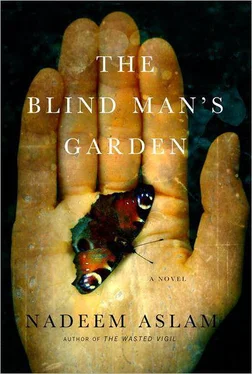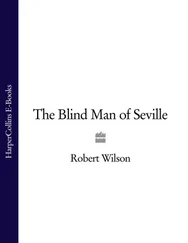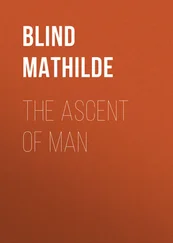A terrorist walks to the centre of the floor and speaks into the massive immobility, asking all Christian, Shia and Ahmadiya teachers and children to come forward.
Beside the door, just behind the terrorist with his foot on the plywood switch, two ten-year-old girls are about to stand up when Naheed, sitting with her arms around them, tightens her grip by a fraction and slightly shakes her head once.
‘You should not be here,’ Mikal whispers.
‘I dreamt about you before meeting you,’ says the girl, ignoring his words. ‘It was the night before my brother brought you home.’
‘You should not be here.’
She is with him at the top of his night wall, the snow leopard in her arms and the stars falling above the three of them in a tremendous living flood that reaches down to brush against them in slow currents of soft glass grit. The top of the wall is wide enough for four people to walk side by side, and there are raised edges to prevent a fall — edges meant to hide behind and shoot at the raiders or assailants outside during a siege. But now they are concealing the two of them. The constellations are sturdy or faint diffusions in the dark panorama and he whispers their names to her. So many intensities of light, all in flakes and bands and tilted shelves, of the light and within the light, sometimes blindingly brilliant especially to the west where the sky looks as if it is on fire from inside, blinking so forcefully it is a surprise they do not make a sound. Causing a dizziness. And down here there is her life-altering touch on his skin. He tells her of the number of occasions he was discovered lying horizontally on a bough thirty feet above ground in Rohan’s garden, watching meteorites fall or peering up through the telescope, an instrument he called ‘a glass-bottomed boat for the sky’. She tells him of an incident from her eldest brother’s childhood. ‘Something has appeared on the other side of the hill,’ he had said to his parents and uncles one day. ‘It’s black in colour and very strange.’ The men had armed themselves and left to investigate.
‘What was it?’
‘A road.’
‘You should not have come here.’
‘I turned back twice but had no alternative. You stopped coming to me.’
He raises his fingers to his brow. The place where once there was a bruise, a faint swelling. Soon after Naheed was married to Jeo, he had struck his head against the floor one night. The torment of thinking of her with someone else. The pain has awakened of late though the discolouration has long since faded. Love is a distinguishing mark, something by which a dead body can be identified.
*
As the sun rises he is in the field of yellow flowers, listening to the breeze, to his own breath. He has been here since before dawn, soon after she left the wall. He had wanted to see if Akbar’s father would arrive, and as he had waited three figures had appeared and then Mikal had heard the father’s Datsun. The man drove into the flowers and met them. It was brief. Mikal had watched from where he hid as an object exchanged hands. After he pocketed it — Mikal suspected it was a satellite phone — the men had driven away. Before leaving himself Akbar’s father had unfolded a prayer mat onto the flowers and had said his prayers, spending a longer period on them than was required.
Mikal thought they would be Americans, the three figures he met, but they were Pakistani. Military or the ISI, who will capture al-Qaeda terrorists for the Americans. And it might not be a satellite phone; it could be a vehicle-tracking beacon or a covert surveillance camera to be installed in the south wing.
When will the operation against the al-Qaeda guests be launched and how severe will it be? The raid that occurred at the village a hundred miles away had begun at 3 a.m. The forces had attacked five houses. Three helicopters had brought sixty soldiers but only two of the helicopters had landed and unloaded, the third remaining overhead, providing surveillance and aerial support. Someone said there was a fighter jet too, giving air cover during part of the fourteen-hour siege and battle. About twenty people, possibly including three women and four children, were killed. Whether the dead women were helping al-Qaeda is not known.
The sun is climbing gently, breaking free of the horizon to become rounder and solidifying the way liquid metal does. A sound behind him and he turns to see the Airedale dogs looking at him from ten yards away, standing beside each other on those blood-red legs, the eyes too appearing red in the long slow rising of the sun. He watches and listens, darting a quick glance to either side, but there is no one. At least no one who reveals himself. Suddenly certain that the three animals have killed humans he reaches into his pocket for the knife. Their heads — formidable, big of brain — are the same height as his neck. He looks down at the knife blade reflecting the rays and when he lifts his eyes only a second later the animals have vanished and he waits for something to happen, looking at the conical hills in the distance. Nothing. He walks back to the house, keeping the blade of the knife unfolded most of the way, and he goes in through the kitchen where the cook is singing a song to herself, giving voice to some quiet ache inside her. She pours him a bowl of tea. When he arrives at the gun factory the three dogs are chained up to the saptaparni trees.
*
The grass growing tall between the car husks and the empty rocket shells, he is digging in the area strewn with scrap metal outside the factory, yellow wasps flying in and out of a bullet hole in a rusting truck fender near him.
He digs to the depth of three feet until he has reached a pocket of sand and then puts away the spade and leans down into the pit, working the sand grains away with his fingers. The Mercedes-Benz of modern pistols, it is said about Glocks that they can be buried in sea sand for several weeks and removed and fired immediately. The replicas made at this factory must undergo a similar test. And so minutes after digging them up, Mikal and Akbar’s brother are firing them onto targets painted on the scrap metal.
On more than one occasion during the course of the morning Mikal interrupts work with the intention of locating Akbar, to tell him what he saw at dawn. Again and again he comes to the door, where a boy of ten sits on a woven reed mat, refilling spent bullets so they can be used again.
After the buried Glocks have been cleaned and polished, Akbar’s brother asks him to take one of them to the south wing of the house.
‘Give it to the man on the veranda.’
But there is no one there. Mikal clears his throat and stands looking around. On the wall is a plaque which has been painted over but is peeling and some of the text is visible. In any case he knows from Akbar what it says. ‘The Connolly Ward’. A white man who was executed by the Amir of Bukhara in 1842, on suspicion of spying for the British. He moved through the Central Asian republics under the name of Khan Ali, adapting it for its resemblance to his real name, and he was the one who invented the term ‘the Great Game’. Refusing to convert to Islam while the prisoner of the Amir of Bukhara, he was taunted for his faith and made to go through terrible suffering. After his death his sister would write to any new clinic or hospital when it opened, requesting to support a bed or ward in his memory.
Mikal clears his throat again and then pushes open the door and goes into the room which has light-absorbing cement walls and a cold terrazzo floor and he calls out a salutation and stands listening. Against the wall is a stack of cardboard boxes. Inside the one he opens there are hundreds of documents — booklets, instruction manuals on how to make and use explosives, training manuals for guerrilla warfare. There are notebooks, their corners rubbed off by handling and grimy like the ones in which butchers keep customer accounts. On the pages are techniques for kidnapping and assassination. He lifts out a folded letter dated 12 February 2001 to someone named Abu Khabab al-Masri. Most respected Abu Khabab, I am sending five companions, who are eager to be trained in explosives and other methods of joyful bloodshed. Concerning the expenditure, they will pay you themselves. All are trustworthy …
Читать дальше












